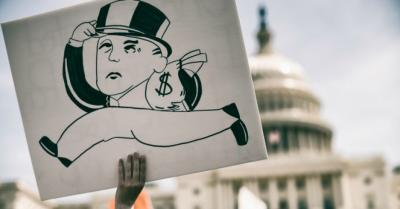

by Whitney Webb, True Activist
Despite promising to "break-up the special interest monopoly in Washington,” records of Trump’s private meetings in his first 100 days in office show that he has not only invited those same special interests into the White House but has allowed them to strengthen their choke-hold on the American political system.
While most Americans – Trump supporters and detractors alike – have realized that the President’s campaign promise to “drain the swamp” is unlikely to happen, a new analysis from the watchdog group Public Citizen has made it official. According to the group’s new report, titled “Corporate Executives Swamp the White House,” Trump has met with at least 190 corporate executives since his inauguration. Since becoming President-Elect, that figure jumps to 224. In addition to corporate CEOs and other captains of industry, Trump also met with several controversial billionaires in his first 100 days, including Sheldon Adelson, Carl Lindner III, Bill Gates, and David Koch.
The numbers do not include the president’s frequent telephone conversations with Wall Street CEO’s, such as Steve Schwarzman of Blackstone, nor do they include meetings with administration members, advisors, and nominees.
“Donald Trump has asked America’s CEOs for marching orders, and in meeting after meeting, they are happily issuing instructions,” said the group’s president Robert Weissman in a press release. “As best anyone can decipher what’s going on at the White House, the CEOs are in charge now—and they are predictably advocating their narrow, short-term profitability interests, not what’s in America’s interest.”
The report was issued just days after the Trump administration stated it would no longer disclose visitor logs to the White House, Trump Towers, or the president’s Mar-a-Lago resort to the public, a move which has caused concern among several accountability watchdogs and rights groups. The unavailability of those key documents, which have been available to the public in all previous presidential administrations, did not dissuade Public Citizen, however. They instead used news reports and White House press releases to assemble a list of Trump’s publicly-acknowledged private meetings.
Based on the data, the majority of CEOs who have met with Trump belong to the private financial sector, representing one out of every five meetings during the president’s first 100 days in office. Trump’s meetings with Wall Street’s most influential, such as Citigroup’s CEO Michael Corbat and JP Morgan’s CEO Jamie Dimon, may have influenced Trump’s recent executive order to lessen Wall Street regulations as well as his reversal on central bank interest rate policy.
Though Trump on the campaign trail stated that “our campaign is about breaking-up the special interest monopoly in Washington, D.C.,” Weissman argues that even the limited data available to the public regarding Trump’s private meetings proves otherwise.
“President Trump not only has betrayed the promises of candidate Trump by failing to break up the special-interest monopoly in Washington, D.C., he has invited the special interests into the White House and asked them for guidance on how to deepen and perpetuate their monopoly,” Weissman said.

